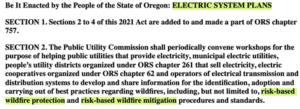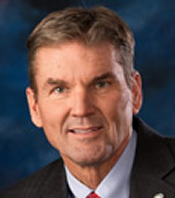 By Oregon State Senator Dennis Linthicum
By Oregon State Senator Dennis Linthicum
February 23, 2024
Our political elites mis-use economics. They use economic projections as sales, marketing and sloganeering tools. Their central planning and control efforts form an endless barrage of claims hoping for votes, then power, money and control. Think about clean energy, immigration, Measure 110, micro-electronic circuit or housing development and employment.
Are these examples sincere problem solving efforts or merely attempts to overtake the economy and grab money, power and control?
As always, when there is one political claim there is always another. But, what is the truth of the matter? Can any of these claims about solving problems and improving the lives of Oregonians be true?
Regardless, the state’s collectivist marketeers get right to work.
The French economist Frédéric Bastiat described our problem in his 1850 essay, “That Which Is Seen, and That Which Is Not Seen.” He wrote, “The bad economist pursues a small present good, which will be followed by a great evil to come, while the true economist pursues a great good to come, — at the risk of a small present evil.”
The adjectives he uses are – bad verses true, instead of bad verses good. We have become accustomed to think in terms of moral categories like bad verses good. The lesson for us is, we should strive for truth, then our moral compass will be set straight.
I suggest, our state’s political quagmire would clear immediately, if we asked, “Is that true?”
For example, the open border policies have grown to allowing more than 300,000 migrants to cross illegally into the US monthly. Obviously, this is deliberate, but are we solving anything problems or are we just moving the problems around on a map and making them worse? The recently failed $118 billion border security bill only had $20 billion for US border security.
Does that sound like a solution, a marketing ploy, or magic?
When our political elites use falsehood to advance an idea, it’s more than bad policy, it’s bad economics. The border example, works well to illustrate this point. Has the influx of multiple millions of illegal immigrants provided any economic, practical, moral, life and livelihood benefits to the US or to the various countries of origin that lost these people? The claim is that we are saving lives but the administration is not advancing freedom, shutting-down socialist dogma or pressuring our other countries to adopt free-market economies.
How can we best help, by proving handouts or opportunities? Here or there? What’s marketing and what is truth?
And, for all of our global concerns, why isn’t anyone asking the truth questions about Cxvoid “science”?
Was social distancing was effective? Is there scientific evidence that face masks can stop a respiratory virus? Were Randomized Controlled Trials (RCT) performed to confirm asymptomatic transmission claims? Did plexiglass barriers, the constant washing of grocery counters, or disinfecting shopping carts handles provide any documentable benefits?
The scientific totalitarians will have trouble with each of these questions, as well as, accessing risks associated with the mRNA injections which are skirted or ignored daily.
Why is Oregon’s political class unwilling to seek truth.
Remember, forty million Americans lost their jobs, and nearly 10 million of those are still unemployed. Income in America fell to such low levels that federal tax revenues decreased by more than 50 percent year over year by mid-year 2020.
Yet, the federal government cranked up the printing presses and distributed $350 billion to states and local governments as part of the 2022 pandemic aid bill. Those monies have to be spent by this year’s end or the feds will send their agents to take it back.
Why was this mandatory time frame part of the legislative package? It clearly wasn’t designed for the slow, deliberative, and prudent considerations that would normally accompany prudent decision-making. Rather, the mandatory time-constraint was designed to generate a momentary statistical blip for propaganda purposes.
The story always reads better if the pols can claim, “all is well in our local economies.” Complete tommyrot.
As in the earlier quote, “The bad economist pursues a small present good, which will be followed by a great evil to come…,” and no one knows the long-term impacts on our horizon.
Remember, untold numbers of small businesses remain closed. Thousands of individuals, moms, dads, and family members lost their jobs, and these job losses will get muddled with the statistical averages from foreign nationals, undocumented immigrants or illegal aliens who are also looking for employment.
On a legislative note here in Oregon, let me touch on, SB 1508. This bill recently passed the Senate Floor, and will move to the House. It is a prime example of government intervention with unintended consequences.
This bill started as my attempt to curb run-away Insulin prices. However, I voted “NO” because the bill had grown less attractive after each edit.
For background, I am alive today because of multiple daily injections of insulin. I have been injecting insulin for more than 50-years, so, I fully understand the life and death nature of insulin. Especially, in terms of medical need, cost and availability.
Yet this bill illustrates government taking the easy-way out. Essentially, this is a legislative mandate limiting charges for insulin to just $35 a vial, from insurance providers operating within the state.
Insulin prices are not driven by extravagant insurance co-pay fees. Insulin prices actually get generated at the manufacturing level, by supply and demand for source materials, research, development, technology, manufacturing and regulatory requirements. Unlike ice cream which experiences greater demand during the summer, insulin has a fairly constant demand curve.
Yet, a major price factor is law-fare – practices that protect big manufacturing dominance through endless trade secret and patent protections. Patent protection are are limited and expire for various insulin formulations but manufacturing techniques are typically protected by trade secret law without limit.
Demanding insurance providers squeeze other plan participants meet the difference directly helps patients but doesn’t solve the problem. In other words, we only moved the problem from one spot on the map to another, as manufacturers enjoy continued market protection.
No doubt people appreciate the lower cost and affordability of this life-saving medication, but what is government accomplishing? The “unseen” never gets mentioned. How many unintended consequences cascade down the line when government steps in to solve any particular problem?
system by twisting some segment of our economy. Like minimum-wage laws, paid-leave laws, laws restricting housing, land-use or drug-use there is always a problem that government created which will fester until really hurts. Meanwhile, the politicians, bureaucrats, political donors and cronies get to skate happily along and everything looks good until the next catastrophe.
We can only succeed by empowering individuals. We slow down and curb the state’s bureaucratic enterprise at every turn. We must hold politicians accountable for their false projections and the deleterious impacts of their socialist policies. Truth must be our standard.
Only through free-markets, with clear determinations of truth and fallacy, can we will rebuild the American dream. Yes, even here in Oregon.
If we don’t stand for rural Oregon values, no one will…
© 2024 Dennis Linthicum – All Rights Reserved
E-Mail Dennis Linthicum: d4linthicum@gmail.com
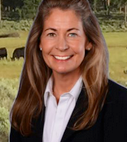 By Oregon Senator Diane Linthicum
By Oregon Senator Diane Linthicum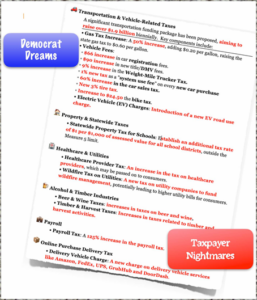 Just last month, the quarterly revenue forecast showed Oregon’s ending balance is higher by $309.5 million than last forecast. You might think Gov. Kotek would be satisfied.
Just last month, the quarterly revenue forecast showed Oregon’s ending balance is higher by $309.5 million than last forecast. You might think Gov. Kotek would be satisfied.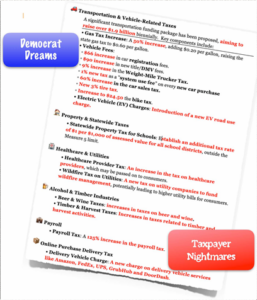 Just look at the taxes being dreamed up by the Democrat party who control both chambers of the Oregon legislature. As representatives, they think of themselves as those who know best. Yet they know nothing about your personal or business finances, let alone anything about your family’s needs.
Just look at the taxes being dreamed up by the Democrat party who control both chambers of the Oregon legislature. As representatives, they think of themselves as those who know best. Yet they know nothing about your personal or business finances, let alone anything about your family’s needs.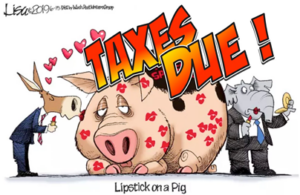 This phenomenon is part of George Orwell’s eerie genius in his book, 1984. In this cautionary tale he clearly expresses the uncanny notion that once the passion for power takes hold it will animate the coming bureaucracy.
This phenomenon is part of George Orwell’s eerie genius in his book, 1984. In this cautionary tale he clearly expresses the uncanny notion that once the passion for power takes hold it will animate the coming bureaucracy.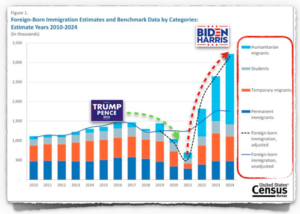 “His summary was, “Economy is idealism in its most practical form.”
“His summary was, “Economy is idealism in its most practical form.” They are leaving because of Oregon’s punitive tax policies, increases in crime, the state’s cost of living, and escalating home prices. Meanwhile, employment and private sector opportunities continue to dry-up.
They are leaving because of Oregon’s punitive tax policies, increases in crime, the state’s cost of living, and escalating home prices. Meanwhile, employment and private sector opportunities continue to dry-up.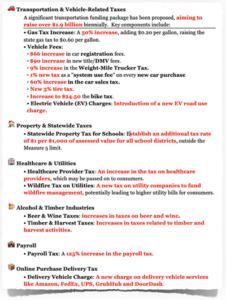 Here are a handful of the destructive ideas being considered:
Here are a handful of the destructive ideas being considered: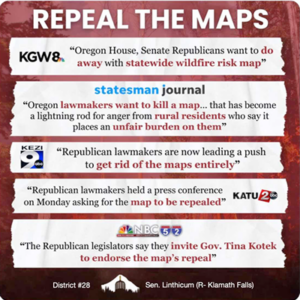 But SB 762 was a sleight-of-hand ruse.
But SB 762 was a sleight-of-hand ruse. Additionally, Gov. Brown and Sen. Golden’s Fire Maps Bill (SB 762) removed the $25.00 per parcel limit on forest protection district assessments (taxes) as imposed by ORS 477.060.
Additionally, Gov. Brown and Sen. Golden’s Fire Maps Bill (SB 762) removed the $25.00 per parcel limit on forest protection district assessments (taxes) as imposed by ORS 477.060.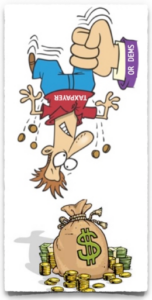 The mainstream media is constantly telling us, “With the three-fifths supermajority in both the Oregon House and Senate chambers, Democrats can raise revenue without any bipartisan support.”
The mainstream media is constantly telling us, “With the three-fifths supermajority in both the Oregon House and Senate chambers, Democrats can raise revenue without any bipartisan support.” By Dennis and Diane Linthicum
By Dennis and Diane Linthicum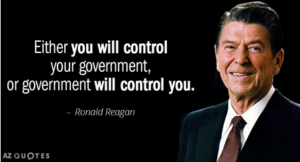 He joined Hughes Aircraft Co. just before we were married and was involved with data-structure design, management and implementation endeavors when processing power was slow and expensive.
He joined Hughes Aircraft Co. just before we were married and was involved with data-structure design, management and implementation endeavors when processing power was slow and expensive. I mention these things simply to note that just like today our past had its share of fake news and fear-mongering. The problems were real and needed solutions. But we must remember that government is rarely the right tool. Problems are more readily solved in free, unhampered markets rather than by confiscating vast sums of money from misled taxpayers for poorly conceived ideas.
I mention these things simply to note that just like today our past had its share of fake news and fear-mongering. The problems were real and needed solutions. But we must remember that government is rarely the right tool. Problems are more readily solved in free, unhampered markets rather than by confiscating vast sums of money from misled taxpayers for poorly conceived ideas. This morning’s newsletter will be short as I express my Thankfulness, I also want to encourage you to spend time with your friends, families and loved ones as we will have plenty to do in the near future. Courage, Resolve and Virtue must be our watchwords because the opportunities, here in Oregon, will be tremendous.
This morning’s newsletter will be short as I express my Thankfulness, I also want to encourage you to spend time with your friends, families and loved ones as we will have plenty to do in the near future. Courage, Resolve and Virtue must be our watchwords because the opportunities, here in Oregon, will be tremendous.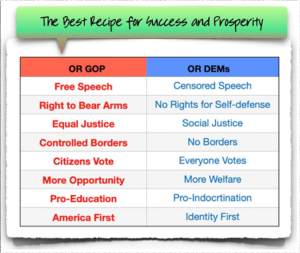 In short, this is our opportunity to fix this Tasteless Gruel.
In short, this is our opportunity to fix this Tasteless Gruel. Again, oppression does not grow within a neighborhood. Jim Crow laws were not universal but were created in the Democrat south as a means to keep their evil and repugnant attitudes alive following the Civil War. Most states across the US never created these atrocious laws, but those pernicious few are deemed historical fact for the entire nation.
Again, oppression does not grow within a neighborhood. Jim Crow laws were not universal but were created in the Democrat south as a means to keep their evil and repugnant attitudes alive following the Civil War. Most states across the US never created these atrocious laws, but those pernicious few are deemed historical fact for the entire nation.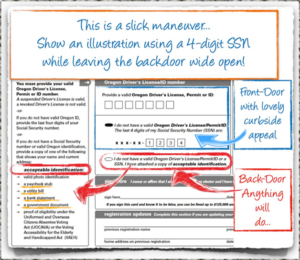 So, this is what it looks like online (hand-written markups are mine):
So, this is what it looks like online (hand-written markups are mine):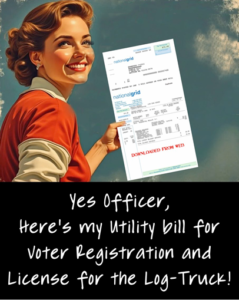 In the Secretary of State’s race, my opponent keeps telling us that he wants to increase access to voting. What’s left? It is like watching the political equivalent of Molière’s Tartuffe, or Dickens’ Mr. Pecksniff where everything is spoken, announced and reported with sleek imagery, beautiful words and high-minded principles while the substance of a thing is missing.
In the Secretary of State’s race, my opponent keeps telling us that he wants to increase access to voting. What’s left? It is like watching the political equivalent of Molière’s Tartuffe, or Dickens’ Mr. Pecksniff where everything is spoken, announced and reported with sleek imagery, beautiful words and high-minded principles while the substance of a thing is missing.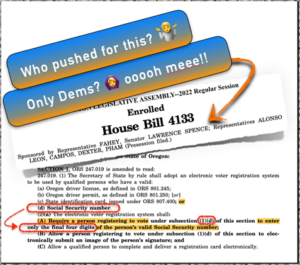 In Oregon there were three valid forms of ID: a drivers’ license, a drivers’ permit, or a State issued ID card. HB 4133 added another option, a valid Social Security number. But look at the actual wording and you will see that a SSN is not required, rather only the final four-digits are required.
In Oregon there were three valid forms of ID: a drivers’ license, a drivers’ permit, or a State issued ID card. HB 4133 added another option, a valid Social Security number. But look at the actual wording and you will see that a SSN is not required, rather only the final four-digits are required. Why then, would legislators demand useless data as a valid method of identification? Would you vote for any legislator that is not capable of recognizing the blatant problems with this legislation?
Why then, would legislators demand useless data as a valid method of identification? Would you vote for any legislator that is not capable of recognizing the blatant problems with this legislation?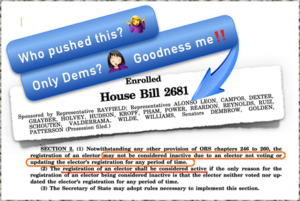 Fraud, or fair-play? Does this make sense? Does it match the rhetoric?
Fraud, or fair-play? Does this make sense? Does it match the rhetoric?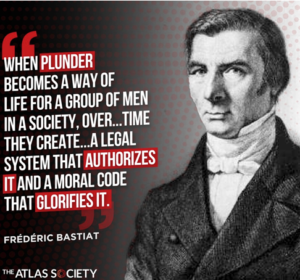 Thomas Jefferson wrote, “The God who gave us Life, gave us Liberty” and believed government should protect Life, Liberty and our own just pursuits for individual Happiness.
Thomas Jefferson wrote, “The God who gave us Life, gave us Liberty” and believed government should protect Life, Liberty and our own just pursuits for individual Happiness. This is mainly because of the hard truths spilling from the news. These realities can no longer be ignored – inflation, housing, transportation, energy, food supplies, public-service degradation, forest management, air quality, immigration, organized crime, cartels, fentanyl, and behavioral health are all signposts that demand accountability.
This is mainly because of the hard truths spilling from the news. These realities can no longer be ignored – inflation, housing, transportation, energy, food supplies, public-service degradation, forest management, air quality, immigration, organized crime, cartels, fentanyl, and behavioral health are all signposts that demand accountability.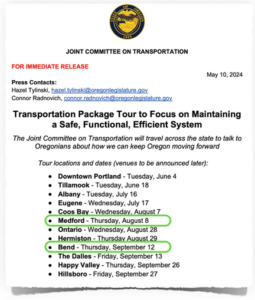 This is more than an inconvenience because the confusion sown feeds fear and uncertainty in the public mind. This is quite palpable today and this confusion is getting fanned by the political elites in steering ‘consensus’ towards their projects, goals and/or proposals regardless of any flaws.
This is more than an inconvenience because the confusion sown feeds fear and uncertainty in the public mind. This is quite palpable today and this confusion is getting fanned by the political elites in steering ‘consensus’ towards their projects, goals and/or proposals regardless of any flaws. The media likes to tell us that the Harris team has it all wrapped up. But this too is puffery. Unfortunately, the majority party here in Oregon always falls for fake media news and think the same way. But they are all struggling against reality; they can’t defeat truth.
The media likes to tell us that the Harris team has it all wrapped up. But this too is puffery. Unfortunately, the majority party here in Oregon always falls for fake media news and think the same way. But they are all struggling against reality; they can’t defeat truth.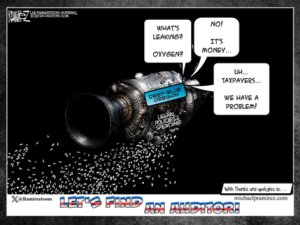 We can count housing units and ask, are we building a continual supply chain of new homes? We can measure the economy and ask, is Oregon inspiring private business entrepreneurship, full-time employment, real property rights and prosperity?
We can count housing units and ask, are we building a continual supply chain of new homes? We can measure the economy and ask, is Oregon inspiring private business entrepreneurship, full-time employment, real property rights and prosperity?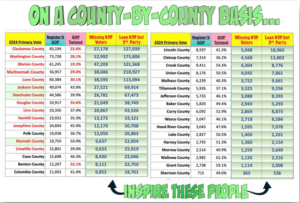 This is really just common-sense and believe me, on county-by-county basis this is very do-able. Look at the following numbers; look at the turnout in your county. How do we reach these people?
This is really just common-sense and believe me, on county-by-county basis this is very do-able. Look at the following numbers; look at the turnout in your county. How do we reach these people? They put great stock in the necessity of personal virtues for freedom. Virtues like peace, patience, understanding, forbearance, and self-control were viewed as non-negotiable for remaining free from the chains of tyranny.
They put great stock in the necessity of personal virtues for freedom. Virtues like peace, patience, understanding, forbearance, and self-control were viewed as non-negotiable for remaining free from the chains of tyranny. Together we can and will turn Oregon back to the common-sense values of hard work, freedom for small businesses and entrepreneurship, utilizing our abundant natural resources both productively and sustainably, and ensuring excellence and ingenuity in our educational outcomes.
Together we can and will turn Oregon back to the common-sense values of hard work, freedom for small businesses and entrepreneurship, utilizing our abundant natural resources both productively and sustainably, and ensuring excellence and ingenuity in our educational outcomes.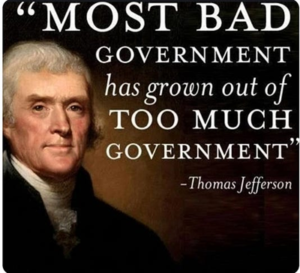 We don’t need any more go-along, get-along, happy-camp Republicans who will ride along with the Four-Modern-Horseman of the Apocalypse – Tax, Spend, Regulate and Rule.
We don’t need any more go-along, get-along, happy-camp Republicans who will ride along with the Four-Modern-Horseman of the Apocalypse – Tax, Spend, Regulate and Rule. committee hearings. Many of these financial injustices have now become part of the fabric of our lives, but isn’t that the point? We have become so accustomed to, or so enamored with some program or another, that most of us don’t remember why it was done in the first place.
committee hearings. Many of these financial injustices have now become part of the fabric of our lives, but isn’t that the point? We have become so accustomed to, or so enamored with some program or another, that most of us don’t remember why it was done in the first place. from fiction and propaganda. He was not willing to allow himself (or us as readers) to be led away by a, “weird mixture of the irresponsible, megalomaniacal ideas which erupted from German thinkers during the nineteenth century.”
from fiction and propaganda. He was not willing to allow himself (or us as readers) to be led away by a, “weird mixture of the irresponsible, megalomaniacal ideas which erupted from German thinkers during the nineteenth century.”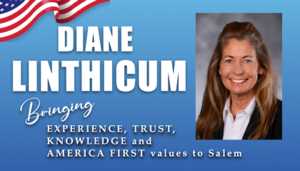 Today, I’ll speak to one issue. I am endorsing one person as the best representative for District 28 in the battle for Oregon’s future – Diane Linthicum!
Today, I’ll speak to one issue. I am endorsing one person as the best representative for District 28 in the battle for Oregon’s future – Diane Linthicum! She is a skilled policy analyst and Diane has keen insight into the legislative process and is willing to, “Just say, No!” to detrimental policy ideas.
She is a skilled policy analyst and Diane has keen insight into the legislative process and is willing to, “Just say, No!” to detrimental policy ideas.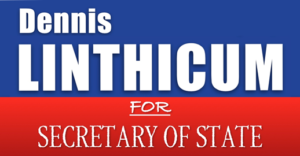
 to account with regard to CxVid, I never made false claims or tried to sell any products, other than TRUTH. Yet, because my Newsletter referred to CxVid. And… in my next breath I mentioned the high possibility of fraXd. That was enough to get my account served up to Omnivore. This is nothing less than government control over what speech is acceptable and what is not. (… No, this isn’t just a private company exercising their private contract rights.)
to account with regard to CxVid, I never made false claims or tried to sell any products, other than TRUTH. Yet, because my Newsletter referred to CxVid. And… in my next breath I mentioned the high possibility of fraXd. That was enough to get my account served up to Omnivore. This is nothing less than government control over what speech is acceptable and what is not. (… No, this isn’t just a private company exercising their private contract rights.)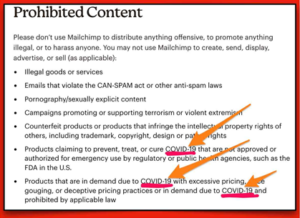 These guys can’t define a woman and don’t know the difference between a heifer and a bull-calf. They have totally screwed up our education and criminal justice systems, increased homelessness, poverty, and drug abuse, and put the economy into the ditch. So, why not give them control of our thoughts, speech and language too?
These guys can’t define a woman and don’t know the difference between a heifer and a bull-calf. They have totally screwed up our education and criminal justice systems, increased homelessness, poverty, and drug abuse, and put the economy into the ditch. So, why not give them control of our thoughts, speech and language too? Whether these actors are elected office holders, executive appointees, agency directors or only members of the bureaucratic army, everyone is just doing their job. They are happy to be employed. They don’t want to be cancelled. It’s better to keep your mouth shut than get into trouble. Everyone seems to be happy doing their job, doing the bidding from higher up…
Whether these actors are elected office holders, executive appointees, agency directors or only members of the bureaucratic army, everyone is just doing their job. They are happy to be employed. They don’t want to be cancelled. It’s better to keep your mouth shut than get into trouble. Everyone seems to be happy doing their job, doing the bidding from higher up…
 The media outlets squabble about the possible shut-down because it is divisive. Regardless of which political party will face the hard facts of our nation’s fiscal future, the other party will continue to advance their programs. The threat of a government shut-down just adds repetitive rhetorical resonance to the meme-machines and allows the shouting to continue. What becomes clear is that without constitutional integrity it’s time to get a bigger manure-spreader for Congressmen and women.
The media outlets squabble about the possible shut-down because it is divisive. Regardless of which political party will face the hard facts of our nation’s fiscal future, the other party will continue to advance their programs. The threat of a government shut-down just adds repetitive rhetorical resonance to the meme-machines and allows the shouting to continue. What becomes clear is that without constitutional integrity it’s time to get a bigger manure-spreader for Congressmen and women. But government money is never free. The regulatory requirements for using federal funds are rarely of practical or fiscally responsible natures. They always carry a political burden.
But government money is never free. The regulatory requirements for using federal funds are rarely of practical or fiscally responsible natures. They always carry a political burden.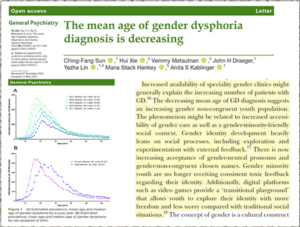 Republicans. However, it is still highly energized by money and the wholly inappropriate goal of sexualizing our youngest children and grandchildren.
Republicans. However, it is still highly energized by money and the wholly inappropriate goal of sexualizing our youngest children and grandchildren. Proponents for restoration of voting rights conveniently ignore that felons lose other civil rights as well, such as the right to sit on a jury, own a gun, obtain various professional licenses, work as a public-school teacher or a law enforcement officer. While these other civil rights are actually lost for a lifetime, the current restrictions on voting only remain in effect while the felon remains in prison.
Proponents for restoration of voting rights conveniently ignore that felons lose other civil rights as well, such as the right to sit on a jury, own a gun, obtain various professional licenses, work as a public-school teacher or a law enforcement officer. While these other civil rights are actually lost for a lifetime, the current restrictions on voting only remain in effect while the felon remains in prison.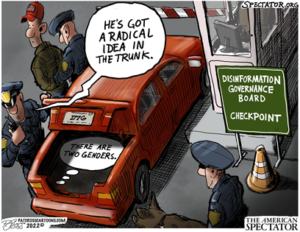 We see powerful social engineers and academic policy pundits using statist power to exert public control without any limits or boundaries. These idealogues are willing to cancel, quarantine, and re-educate anybody who disagrees. In fact, F.A. Hayek, in his book, The Road to Serfdom (1944), notes that social and industrial planner Henri Saint-Simon, thought those who did not obey his proposed planning boards would simply be, “treated as cattle.”
We see powerful social engineers and academic policy pundits using statist power to exert public control without any limits or boundaries. These idealogues are willing to cancel, quarantine, and re-educate anybody who disagrees. In fact, F.A. Hayek, in his book, The Road to Serfdom (1944), notes that social and industrial planner Henri Saint-Simon, thought those who did not obey his proposed planning boards would simply be, “treated as cattle.”